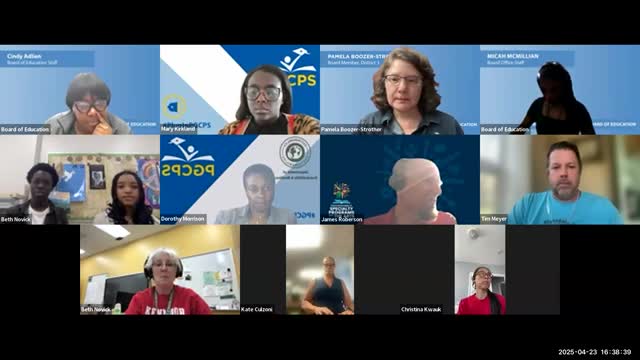PGCPS food services: federal funding loss, new grants and composting expansion noted in CCAP update
Get AI-powered insights, summaries, and transcripts
Subscribe
Summary
District sustainability staff said federal funding reductions may slow some climate and food programs; Food and Nutrition Services reported a state grant award, pending applications for electric buses and school solar, updated policies under review, and four new schools joining the composting program.
Prince George's County Public Schools officials told the Climate Change Action Plan Ad Hoc Committee on April 23 that a drop in federal funding has slowed some planned climate-related programs but the district has won or applied for state and other grants to advance energy and food-systems work.
Why it matters: the district's sustainability and Food and Nutrition Services (FNS) staff said they will rely more on state and philanthropic partners to keep projects moving while they build internal capacity and operating systems to support climate action across schools.
Key updates from the district: Dorothy Morrison, director of sustainability, said the loss of federal funding could slow some programs but that staff are focusing on internal infrastructure, management systems, operating procedures and training. Mary Kirkland, director of Food and Nutrition Services, reviewed several items:
- Grant awards and applications: Kirkland reported a state energy efficiency grant award announced March 11 (amount given in the meeting as "one hundred forty-three thousand" as described by staff) to support building the district's energy database. The FNS team has an outstanding state reimbursement application that staff described as "up to $3,000,000" to support the purchase (with subsequent reimbursement) of up to nine electric school buses. Kirkland also said the district submitted a solar installation application for Walker Mill Middle School on March 26 and is awaiting notice.
- Policies and partnerships: Kirkland said the CCAP-related Sustainability Policy 111 and Purchasing Policy 03/2023 were updated internally and reviewed with legal counsel for board consideration. Christina Garcia Sterling said the district is working with Purchasing to incorporate environmentally preferred-product criteria into solicitations; she said the sustainable purchasing policy was on track to be considered by the board at a forthcoming meeting.
- Composting and food waste: Kirkland and Sarah Gillespie, recycling coordinator, reported that four additional schools were added to the district's food-waste composting program this quarter: Judith P. Hoyer Montessori School, University Park Elementary School, Calverton Elementary School and James McHenry Elementary School. Gillespie noted the district typically starts composting programs in cafeterias and then expands to classroom collection where appropriate.
- Student engagement: Kirkland described plans to build a tasting-panel process that will include students, parents, staff and community stakeholders. The district plans to identify student leaders over the summer to participate in menu reviews and taste-testing so student input can inform menu updates.
Follow-up and next steps: staff said they will continue to pursue state grant reimbursements and philanthropic partnerships to fill funding gaps, convene stakeholders to expand composting and sustainable procurement, and develop the student tasting panel and feedback mechanisms over the summer.
Ending note: committee members welcomed the updates and encouraged staff to coordinate with school administrators and community partners as the district adjusts service models, procurement, and composting expansion.
